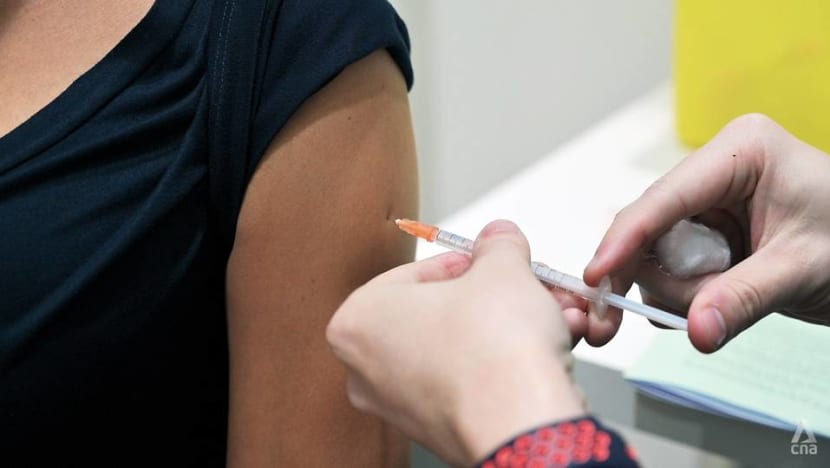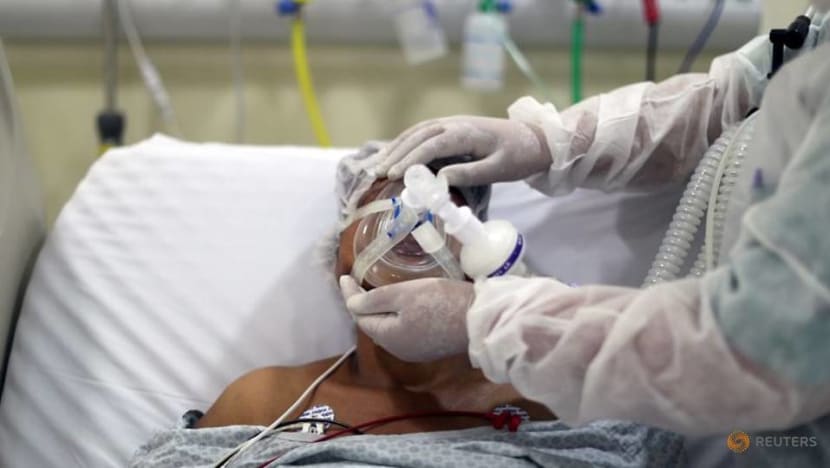Commentary: Waiting for COVID-19 infection to gain immunity just to skip vaccination makes little sense
Even for those who have recovered from COVID-19 infection, it is still worth getting vaccinated to protect against reinfection, says a researcher.

The COVID-19 vaccine being administered at Kolam Ayer Community Club, Singapore, on Apr 21, 2021. (Photo: Marcus Mark Ramos)
STOCKHOLM: Israel was way ahead of the rest of the world when it came to COVID-19 vaccination, so it is not surprising that data from this corner of the Mediterranean causes a lot of excitement. It is a glimpse into the future.
Indeed, this happened recently when researchers at Maccabi Healthcare Services in Tel Aviv released a preprint, a study that is yet to be reviewed by other experts, suggesting people who had been infected with COVID-19 had greater protection than vaccinated people against becoming reinfected with the Delta variant.
Unfortunately, some took this to mean that getting COVID-19 is a better idea than getting vaccinated.
First, the possibility that a COVID-19 infection leads to longer-lived immunity than vaccination is not far-fetched.
Infection exposes our immune system to several viral proteins, whereas the most commonly used COVID-19 vaccines introduce a single antigen, the spike protein. This results in a more directed but also a more restricted immune response than after infection.
Although people who have had COVID-19 can get reinfected, naturally acquired immunity continues to evolve over time and antibodies remain detectable for longer than was first anticipated. New evidence suggests that immunity following both severe and mild infection protects against both symptomatic and asymptomatic reinfection.

However, apart from the danger of drawing conclusions from data that other scientists have not yet reviewed, it is also crucial to put the data in the right context.
RISKS OF INFECTION-ACQUIRED IMMUNITY
Although the study draws attention to the potency of naturally acquired immunity, it does not consider the risks involved in achieving natural immunity through infection. Nor does it cast a shadow on vaccine-generated immunity.
In fact, the benefit of vaccination is not even addressed in the study since unvaccinated people without prior infection were not included for comparison.
The low rate of COVID-19-related hospitalisations among vaccinated participants, eight out of 16,000, would probably be strikingly lower than among non-vaccinated people without prior infection, but this group was not included in the analyses.
A common reason to remain unvaccinated is the misconception that waiting for natural immunity by choosing infection over vaccination is an option. But infection-acquired immunity may come at a heavy cost.
Indeed, apart from the overt risks of severe illness or death, several recent studies show that otherwise healthy people who have recovered from COVID-19 have a substantially increased risk of longer-term serious health problems, including myocarditis or inflammation of the heart muscle, blood clots and stroke, compared to vaccinated people.
And the most rigorous safety monitoring in United States history has shown that COVID-19 vaccines are safe and effective.
With cases surging globally and deaths driven by the Delta variant, waiting for infection - and risking long-term health problems, severe illness and death - to achieve immunity to the very same infection is as fruitless as it is dangerous.
HYBRID IMMUNITY FOR THE RECOVERED
The Israeli preprint does, however, shed light on our increasing understanding of the potent immunity induced by getting the vaccine after having COVID-19, so-called hybrid immunity.
Several studies show a substantial boost in both antibody and T-cell responses to vaccine in people with previous COVID-19 infection.
A recent report from the US Centers for Disease Control and Prevention showed that people who had recovered from COVID-19 and were later vaccinated had half the risk of reinfection compared with unvaccinated people who had previously had COVID-19.
So it is still worth getting the vaccine, even if you have previously had COVID-19.
The effective immune booster following the combination of natural immunity and a single subsequent vaccine jab also raises the question of whether one dose is enough for people who have had COVID-19. Several studies report that immune responses to a single dose of either the Pfizer-BioNTech or AstraZeneca vaccine exceed those after two doses in people without prior infection.
Several countries, such as France, Italy and Germany, therefore now recommend a single dose for people with a previous COVID-19 infection. And infection without vaccination is recognised as immunity for the current Israeli green pass rules.
Listen to Duke-NUS professors David Matchar and Gavin Smith talk about COVID-19 variants and their effect on vaccines:
Although directing boosters to people who have not been infected may make the most of limited vaccine supplies, personalised schedules and exemptions from vaccine mandates may be logistically tricky in the midst of a pandemic.
Antibody screening before vaccination is time-consuming and expensive, and it introduces practical challenges in identifying those who have or have not previously had COVID-19. These exemptions could slow vaccine rollout rather than speed it up.
As unprecedented research efforts deliver knowledge about our immune responses to COVID-19 infection and vaccination on a daily basis, we must critically view the data together with all the facts that relate to it. We are far from bringing the pandemic to an end, and the potential risks of being infected are unquestionable.
Our priority should be to slow transmission and get vaccines to those who remain unvaccinated and need them the most. To avoid vaccination, waiting for infection and hoping for natural immunity makes little sense.
Dr Charlotte Thalin is a researcher in immunology at the Karolinska Institute, Sweden. This commentary first appeared on The Conversation.














